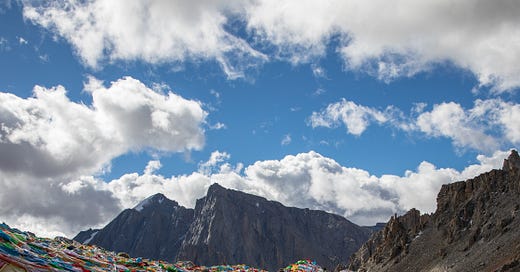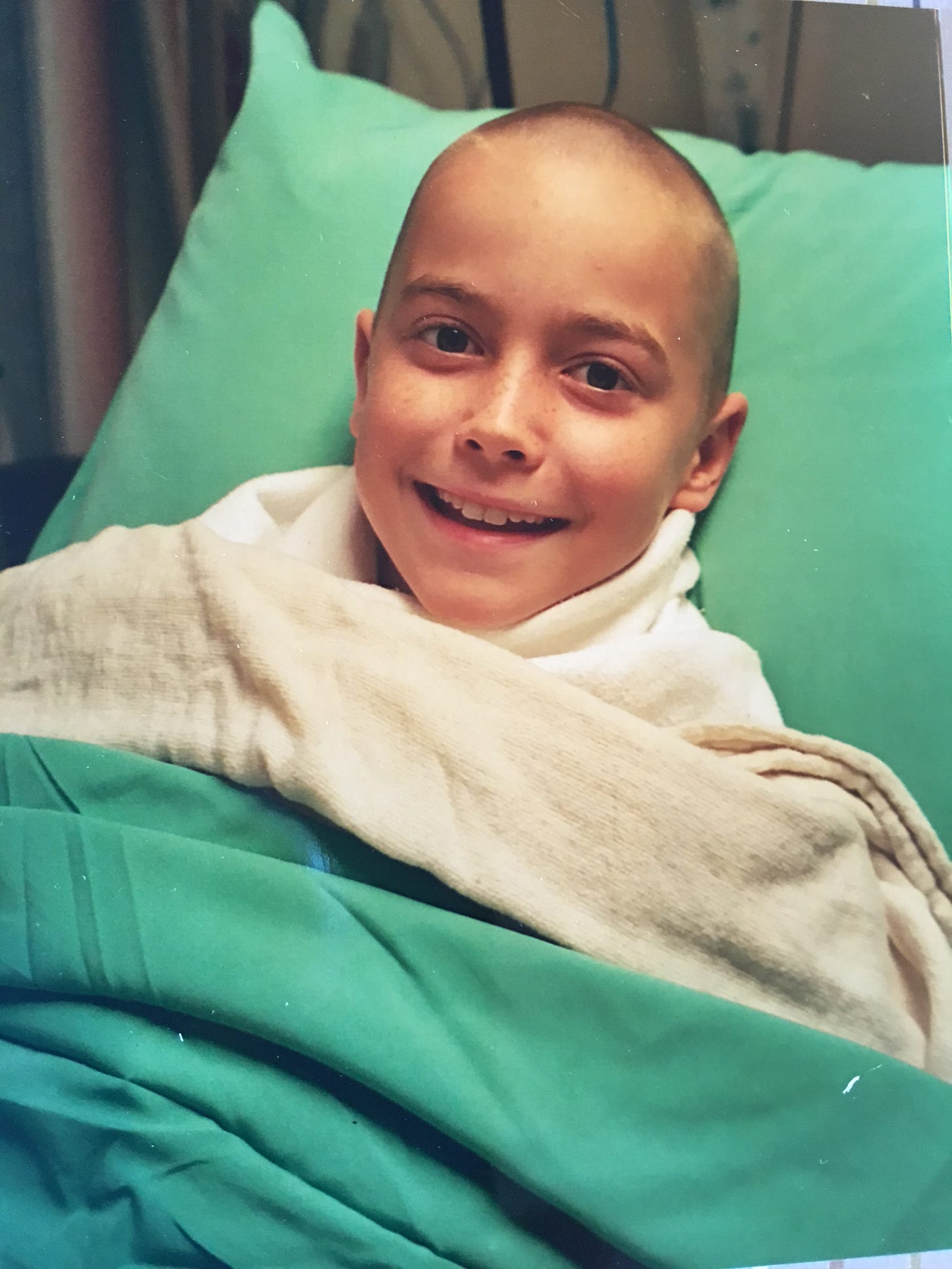At Reducing Uncertainty, we often break down complex topics, from sports to energy to AI, so we can make the best decision possible with the information that we have. My friend Jake’s story is a deeply personal version of navigating uncertainty, in a situation far more real and heavier than any topic we cover here. He navigated this situation with a resilience and passion that is nothing short of inspiring.
I’m proud to call him my friend, and I hope you enjoy his story.
Below, you’ll find a short intro from Jake, as well as an excerpt from his manuscript, “The Path After: A Survivor’s Search for Meaning.” If you’re interested in learning more about Jake’s story, he’s seeking representation to get it published. Please reach out with interest or possible connections. You can also read his other writings on his Medium page.
Here’s a simple premise: A ten-year-old boy shouldn’t have to agonize over his death. He should be outside, shooting hoops in the driveway until well after sundown. Or reading his favorite book series underneath the fort of blankets he and his sister constructed in the basement. Or watching his favorite movie on a rainy Sunday afternoon with his parents. He should be out exploring, learning, and playing. He should have dreams about what he is going to be when he grows up — maybe a baseball player, scientist, or explorer. He should not, especially not, be concerned about if he will grow up at all.
But that can change in an instant. A rare cancer diagnosis accompanied by an unfavorable prognosis. Baseball games, summer barbecues, and pool days traded for treatment plans, anxiety, and weekends isolated in a hospital. A life hijacked. No, a ten-year-old boy shouldn’t have to agonize over his death, but sometimes he has no choice.
I’ll spoil the ending of this particular fight. The boy survives. To know just the result of a journey, however, is not to know the journey itself. The struggles, doubts, trauma, and love experienced during something like a cancer battle stay well beyond the last treatment. Everything, especially the bad stuff, tends to linger.
More than a decade later, trauma from the experience still refuses to relinquish its grip on him. Desperate for healing and answers, Jake joins a group of cancer survivors and doctors on a pilgrimage around the sacred Mount Kailash in Tibet—a journey that, according to several local religions, is supposed to leave his soul reborn.
Amidst the bustling streets of Kathmandu, through the Himalayas, past armed checkpoints, and into the open skies of the Tibetan Plateau, he retraces his cancer journey: the suffocating hospital rooms, the chemotherapy that nearly killed him, and the isolation of being a child forced to reckon with the inevitability of death. Even now that he’s in remission, the experience still has a hold on his psyche, refusing to ever let him truly move on.
In Tibet, he confronts the pitfalls of seeking “ancient wisdom” in Asia, and grapples with the loss of his faith that had carried him through his fight with cancer. When all of the physical forces of the mountain scream at him to turn back, Jake comes face to face with the trauma he has buried for years. Why did his life seem to mean more back then than it does now? Can this path offer him the rebirth he so desperately seeks, or will he succumb to the suffering metastasizing within?
The Path After: A Survivor’s Search for Meaning
The sky is pitch black, and the world howls without abandon. My fingers, numb and shivering, struggle to grip my hiking poles. The unforgiving alpine air burns the exposed skin on my face. Our group manages to take a few more steps up to the next ridgeline before the cumulative fatigue overwhelms us, and we need to rest. Several others and I take shelter against a large boulder right off the path. From our place of refuge, the wind dies down to a manageable roar.
I attempt to take a drink of water from my hydration pack. Frozen. So much for the manufacturer’s guarantee of working in freezing conditions. I had considered this possibility when I was perusing through the local REI, looking for trekking packs to take to Tibet.
“This one will be perfect,” the employee had said in his iconic beige and green vest, “It has insulation along the tubing that will make sure your water won’t freeze in zero-degree temperatures!” I trusted his advice, apparently to my detriment.
I need to write a strongly worded email, I think to myself as I cast the useless hydration tube aside. But my frustration passes quickly. It’s just another bump on this journey, which has always been bigger than a trek around a holy mountain in Western Tibet. A journey that really started fourteen years earlier when my life was shattered in that bare, florescent-lit hospital room. When, as a ten-year-old boy, I came face-to-face with the impermanence of life.
A woman next to me takes out a frozen Nalgene from her pack, and we begin to chip away at the ice inside with a pocketknife. Her name is Mary, she’s in her late forties and has watched two family members die of cancer. Tumors that were caught too late, and treatments that could only prolong the inevitable. Unbeknownst to us both, she too has a tumor growing inside of her. Forcibly inherited like a cursed family relic.
We hunker down to brace ourselves against the elements, chipping away at the ice until it finally breaks loose. Victory! Finally, we can get some water. We take turns, shoveling the ice into our mouths, enjoying the melted water on our tongues. Almost immediately, my tension headache releases. I scan the horizon but the jagged peaks surrounding us remain shrouded in darkness. I can’t see Kailash. We’ve been climbing this portion of the mountain for several hours now. Only a few more to go until sunrise, when we’ll reach the mountain pass, and descend back down.
At nearly 19,000 feet above sea level, the fatigue, dehydration, and altitude are taking its toll. Aside from an unforeseen schedule change due to delays crossing into Tibet, we have been hiking for seven straight days. After over eighty miles of walking, a few members of our group are starting to crack. I noticed it yesterday. They had the thousand-yard stare as they hiked, their demeanor uncommonly silent and dazed. Adrift in an existence between reality and unconsciousness, numb to the dazzlingly array of senses surrounding them in this otherworldly landscape.
We knew this trek wouldn’t be easy, that was kind of the point. Nobody expects that hiking from a remote village in northwest Nepal, through the Himalayas, into Tibet, and then around Mount Kailash, the most sacred mountain in the world, would be a cakewalk. It was a unique challenge that was just as alluring as it was terrifying. One that would inevitably push us, wear us down, and teach us something about ourselves. Has it been enough? Have I found the answers I so desperately sought? I have certainly been forced to reckon with my relationship with cancer and its continued hold on my life. But in this moment, all I can think about is how exhausted I am.
This is a nice spot. I contemplate behind the boulder. I gaze out at the morning sky. The stars have faded, and the faint hint of daybreak lightens the horizon. I could watch the sunrise from here. My mind loses discipline. I consider how nice it would be to finally stop and just rest. Maybe this is far enough. But then I hear amidst the chaotic wind and self-doubt, “Jake, you ready?”
I look next to me and notice that Mary is standing, her Nalgene tucked back into her bag’s side pocket. She adjusts her buff, covering her face against the elements. She repeats the question.
“Of course,” I lie, as I stand up alongside her, using my hiking poles as a crutch to bear most of my weight. I look to the rest of the group and scan their tired faces. I am the youngest, some are as old as seventy-two. A collection of cancer survivors, caregivers, and even a few who have incurable cancer. We will be completing this pilgrimage. Our spirits will be cleansed, and we will be born anew. I need this to be true. Only rebirth, I figure, can save me from the trauma metastasizing within.
A few lock eyes with me as I stand, and they follow suit, rising to their feet. Soon, everyone is up. I look to Dawa, our sherpa leading us upward. He nods; it’s time to continue the journey. The break is over.
Jake is a cancer survivor, writer, photographer, and aspiring author living in Minnesota. He's currently seeking literary representation for his memoir, The Path After: A Survivor’s Search for Meaning. If you’re an agent, or know someone in publishing who might be interested, please reach out to him via his Medium page or by sending him a message here.






Can‘t wait to have a chance to read the fully published work one day.